

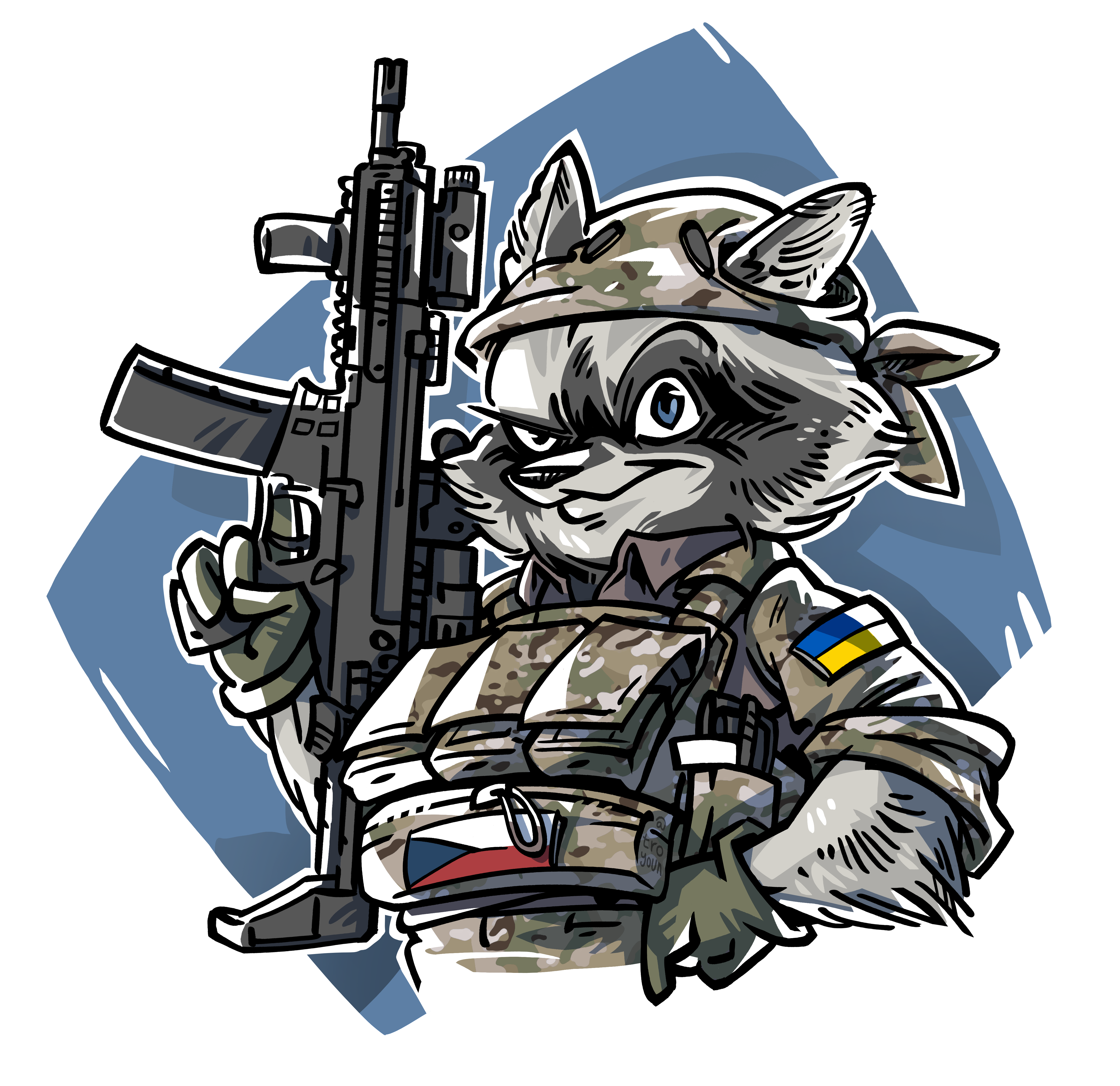
Day One - Start
"Sully" the commander:
As usual, in the last week, before the actual departure to Ukraine, everything gets complicated, technical or other obstacles appear at the last moment. Basically, especially for the organizers, almost home absence starts before the actual departure. For example, even on the day of departure, one of the ambulances has a defective turbo, which runs, but shows sounds and behavior that we do not know when it will leave. A last minute replacement is not possible due to time constraints, so we are at least looking for a new turbo and spare parts to have a backup if it dies en route. The team warehouse has been finalizing the handover and customs documents for the whole expedition, 12 vehicles this time, since the morning. Gradually, as the team people arrive at the warehouse, they get involved in the final packing, labelling and loading of materials into the vehicles. Introductions are made between those who don't know each other yet, and occasionally someone goes to the centre of Prague to pick up equipment that arrived at the last minute (e.g. two dosimeters for the team). In the previous days, intensive work was still going on on the ambulances to keep them in the best possible shape.
It's evening and all the vehicles are loaded, and the final inspection and crew assignment is underway. A total of 26 drivers, 12 vehicles including 7 ambulances and about 10 tons of material aid to Ukraine. In the meantime, the TV has turned up to film our departure and interview us about where we are going. For security reasons, we are not very specific. While loading, a group of newbies is still reviewing with our head medic the basics of first aid and the use of tourniquets (tourniquets for massive bleeding). No one wants an "emergency" but there are some risks involved and it's better to be prepared than surprised.
The following is a safety and organizational briefing prior to the team's departure. During the briefing, everyone is reiterated who the trip leader is, who the deputies are, where they are going and why, what the safety precautions are, and the approximate time schedule for the trip. It is 19:00 and we are getting into our vans, ambulances and other vehicles heading to Ukraine. We have some 800 Kms and about 9 hours of driving to the UA/PL border.
Unfortunately, just after Prague we have bad luck, one ambulance betrayed us. The one where everything looked decent, the turbo went out. We all stop at a petrol station and check the condition. Our mechanic arrives from his workshop on his motorbike to quickly assess the state of the fault. Unfortunately, the ambulance is written off for this trip... nothing to be done. Everything from this ambulance is translated into others, so that they at least partially fit with the material inside the customs declaration and also the destination, because the team will be split and reunited several times during the cut. After a scant half hour of translating in the broken down ambulance, there was a minimum of material left that will just go next time. Everyone gets into the vehicles under the light of the setting sun to help the people of Ukraine.
Martin "The Gift" (Gift for Putin):
"The last tens of hours before departure look like going on a normal family vacation. Only you're not shopping for lotions and swimsuits, you're packing food and water supplies, military clothing and ballistic gear. You quickly sign the contract for the last donated ambulance, praying that the medical equipment you purchased will arrive on base on time. Pick up some signed paperwork, attend a few more fundraising meetings, load up my wife Irene and my friend Zdenek, and head to the base. Once there, I'll realize how big this expedition is. We don't know most of the T4U people at all, but it quickly becomes clear that it won't matter. We check in the reporters, a medic explains how to use a tourniquet to stop massive bleeding from a severed limb, and we load up the rest of the equipment and aid. 6:00 p.m. is Sully's first command briefing. I'm the only one late. Our car's call sign is Kodiak. I'll remember that for a long time. I'm overtaking the entire convoy right at the start. I have a plan: we'll wait for it and get a nice little spin on the whole thing. After 15 minutes of waiting, we discover that the ambulances are already on the highway somewhere, while we are somewhere in a field in central Bohemia. That's a nice start. We're off."
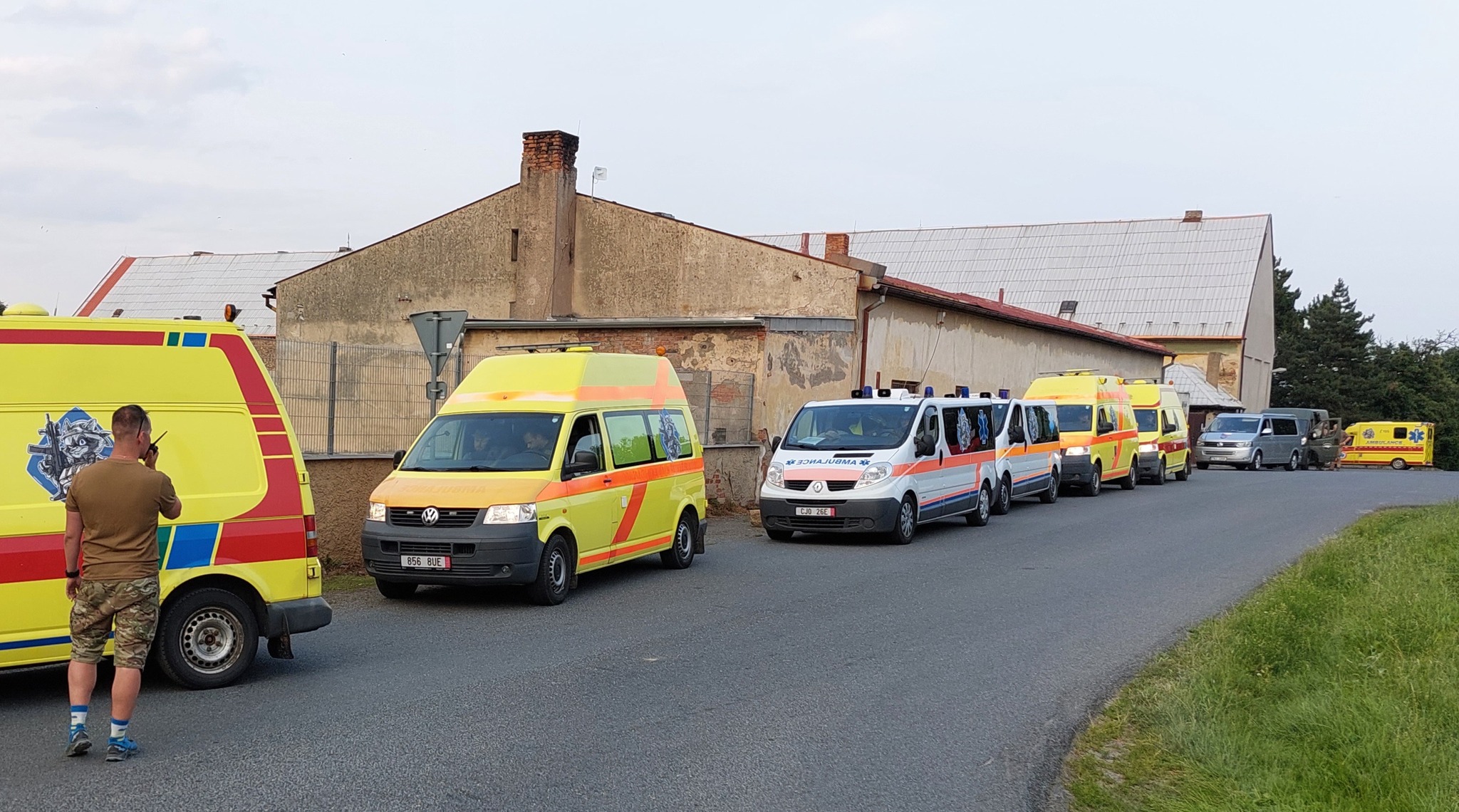
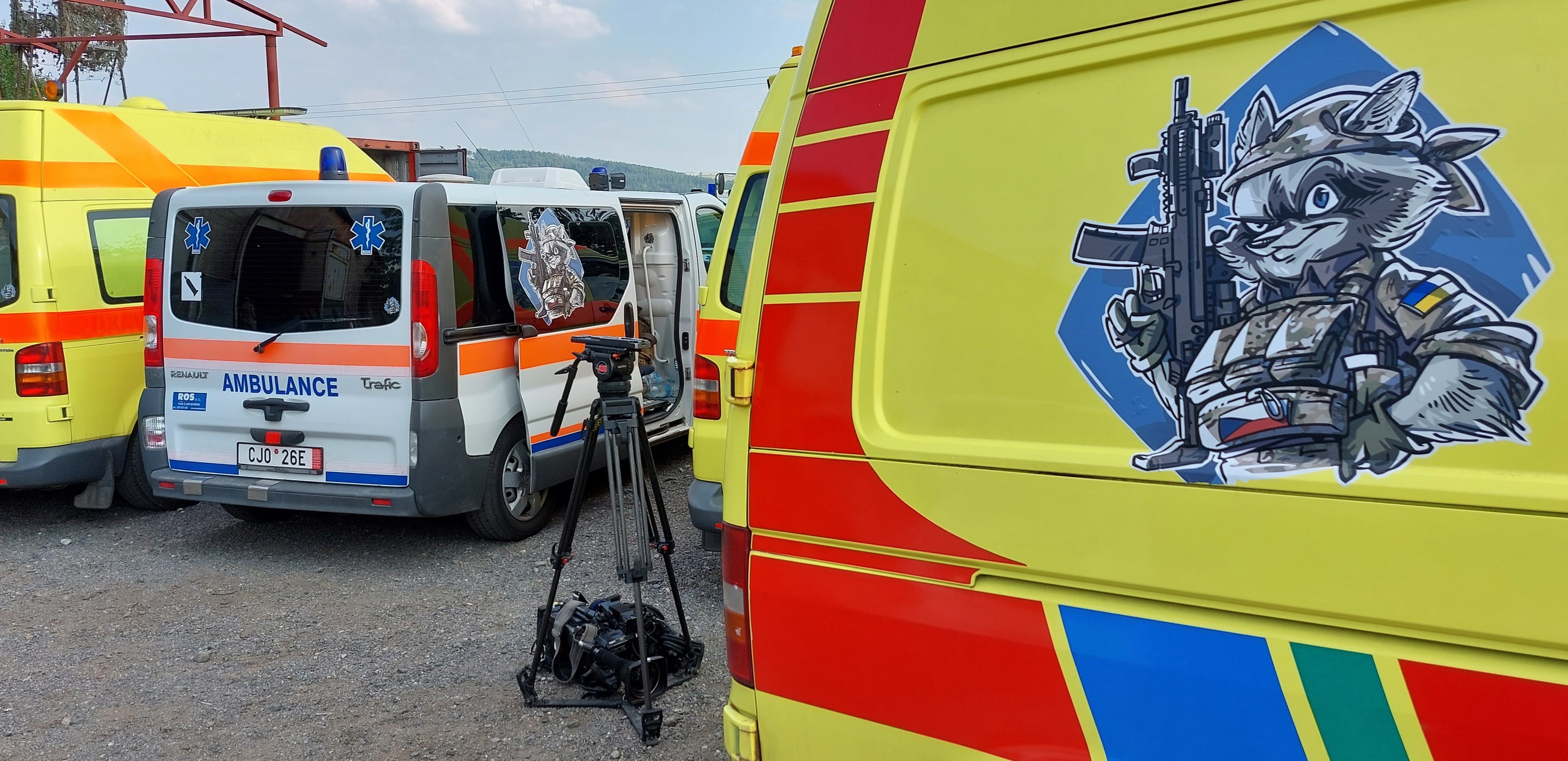
Day two - Bureaucracy and children
"Sully" the commander:
Around 7am we arrived at the border crossing between Poland and Ukraine. The queue at the crossing was for about an hour, no big deal. Unfortunately there was a new problem at the border, ambulances are now subject to a special export permit if they go to conflict areas in Kherson, Donbas and elsewhere. Very nice, the customs officer turns the ambulances around and we have to go 25 Km back, where the paperwork will be processed. Unfortunately, Polish customs officers usually speak only Polish, so it is not always clear what exactly they mean.
I send a group of the escort vehicles Gift for Putin and CESTA Hope of Life z.s. first to the children's home in Vinici so that we don't waste precious time. Mrs. Svetlana, who runs the children's home with war orphans and several disabled children, is already waiting for us. For my group with the ambulances, the road leads 25 Km back, where she is arranging the papers, again via the cloud we download and print the purchase, donation and other contracts. Finally, only to find out that this recommended customs agency can't clear it because it doesn't have extra rights to the conflict areas...supposedly only the one in Rzeszow has that. We pack our 6 ambulances and go to Rzeszow. In Rzeszów we meet a nice lady who fills out everything, chats with us and sends us to the Polish customs. After 2 hours of waiting for customs clearance and confirmation in the system, we head to the crossing in Rzeszów. Thanks to my friends in Ukraine I have priority clearance on both sides of the border and we are off to Vinnitsa. Meanwhile, the rest of the team is there delivering material aid at an orphanage.
Early in the morning we arrive at the orphanage, the rest of the team is already asleep. It is raining heavily and air raid sirens are sounding over the town. The staff of the home provide us with one of the children's rooms to sleep in. I prefer to sleep on a mattress outside, under the roof in the fresh air with the rest of the team. In the morning, after waking up, we prepare for the team's departure. Mrs. Svetlana says goodbye to us and thanks once again to all the Czechs for helping her and the children from her home. Before departure I organize a briefing on the division of the teams, as we are now divided into a "South" and an "East group". The "South" T4U group is going with two ambulances and an escort vehicle from CESTA Hope of Life z.s. heading to Kherson with aid for the soldiers and civilians in this frontline area. The "East" group, on the other hand, is going with 4 ambulances and 3 escort vehicles to the military hospital in Kremenchuk, the ambulance station in Dnipro and to the Kharkiv front to the 41st Mechanized Brigade. Another intensive day starts...
Martin "The Gift" (Gift for Putin):
It is morning and we are in Ukraine. Only, the ambulances are still in Poland. In the pile of various export permits, there is a missing piece of paper that was not needed a month ago. We're waiting. I'm bored, so I research how much the Czech operator here charges for data transfers. I'm all warmed up, so it's suddenly ten degrees higher in the car with the air conditioning off than it is outside, so 45. In a few minutes I have a local SIM card, it has 12 GB of data on it, which will last me the whole trip. It cost 80 crowns. The ambulances have started to process the missing permits and are returning to some depot before the border. We're going to Vinice. Our cars are loaded with aid for the orphanage. We unload it and wait for the ambulances. It's only 450 kilometres. We arrive in the early evening. T4U has been taking care of the orphanage for a long time, unloading piles of clothes, hygiene products, washing machines, dryers, toys, a trampoline and a game console. The home has a huge uncut garden. Zdenek asks why there's so much grass. Their farming is on the edge. And they don't have a scythe or money for gas for the mower. We don't have a scythe, but Zdenek reaches into his wallet and they have gas money. We're all set. I fall asleep sitting in the car, I haven't slept in a day and a half. A few hours later my wife Irena wakes me up. The ambulances are in Ukraine. Hail. I take my sleeping bag and in the garden of my home I find a huge playpen under the roof. There we have 5 hours of sleep, interrupted by that horrible message from a special app that the region where we are may be the target of a missile attack, but after a moment of cursing Putin and the chcimirs who say there is no war here, we fall asleep. We must sleep quickly, morning will be here in a few hours...
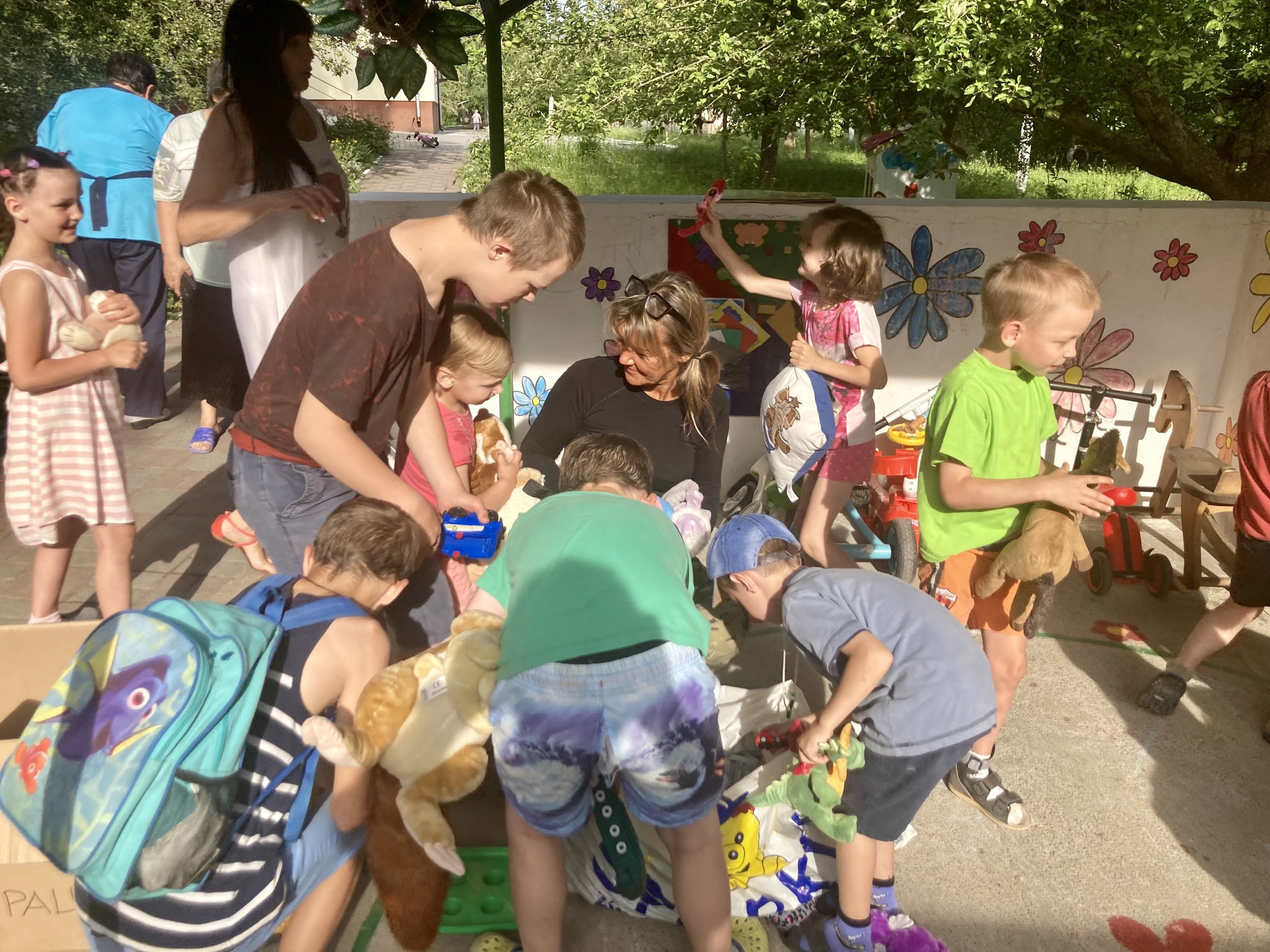
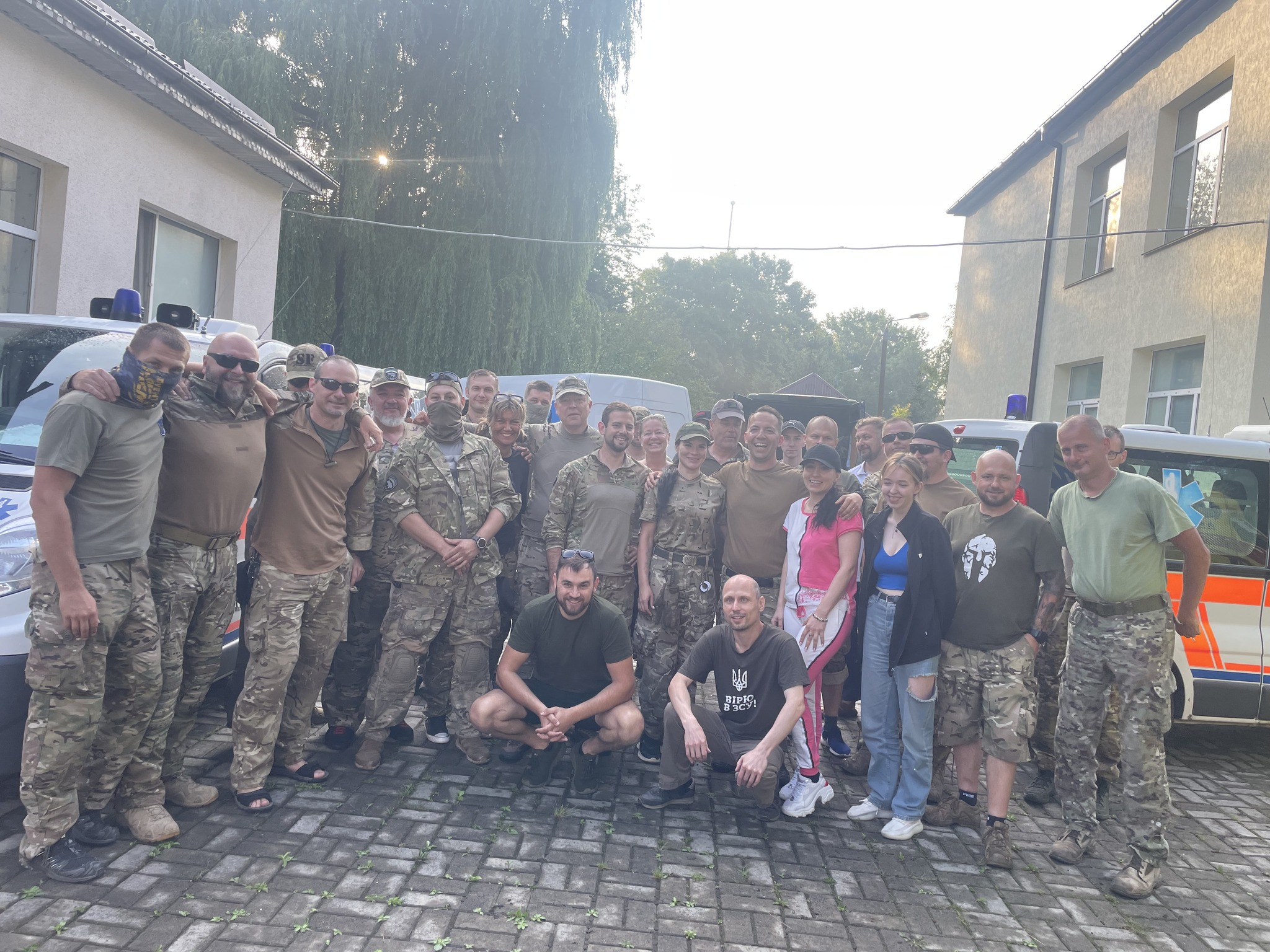
Day three - multidirectional offensive
"Sully" commander of the "East" group:
The groups are divided, all set off for their aid destinations. Unfortunately, the "East" group is unlucky and after a few kilometers a tire defacto explodes on one ambulance in the oppressive heat. We replace it with the spare we got for the ambulance, but the pattern on it is not very good. Just to be safe, we stop at a local tire shop after a few dozen miles of the route and have the tires on all the wheels that don't seem to be working replaced. After an hour of work (there was still a fault on one brake on another car) we are done, we head off in the direction of Kremenchuk Military Hospital.
We arrive at a familiar place for us, this hospital for modern war veterans with severe injuries is supported for a long time together with CESTA Hope of Life z.s. and the Czech Veterans Association. The director of the hospital is an elderly gentleman, but an absolutely wonderful person, defacto he has dedicated his whole life to the care of wounded soldiers and their return to at least a somewhat normal life. We brought again a supply of adult diapers (local consumption is about 3000 Ks/month), a motorized splint for rehabilitation and for some a special thing, two X-Box consoles with accessories. The consoles with monitors and accessories will help wounded soldiers gain sensation and fine motor skills in a fun way. As usual, everyone here is very nice and very grateful for the help from the Czech Republic, together with the director I go to his office to sign the handover protocols and also to discuss help with getting the reclining hospital beds that they desperately need (we have them figured out and in the running, but will report on that another time). The Team 4 Ukraine patch hangs in a place of honor in the director's office above all his certificates, it's almost touching how much he appreciates our support. Before leaving for Dnipro we are forced to accept an invitation to lunch, the hospital prepared a very tasty lunch for all of us as a small thank you. After the meal break we say goodbye with a promise to see you again soon. Now let's head towards Dnipro to the rescue workers of the city.
We arrive in Dnipro in the early evening, at sunset this city is beautiful. The Dnipro River is impressive and the beautiful boulevards and beaches that line it beckon us to relax. The city lives on, despite the occasional bombing, people are trying (as in London in the 1940s) to live and adapt to the dangers that still threaten here. Periodically we get applications ringing in of possible bombing of the city, the same that recently wiped out the city's fire and rescue station. That is also why Gift for Putin made a collection for three ambulances with equipment that we brought here, so that they would have something to save lives with in ordinary accidents and those injured from Russian shelling of the city. The lady from the council proudly accepted the ambulances from us and thanks very much to everyone who contributed. They have already replaced two of the destroyed ambulances and we have now increased their rescue capacity by over 100%. It feels good again, as does all the help here. Now we are sharing again, because the next point where we are taking aid is the area near the Kharkiv front. We're taking one ambulance here with equipment for the Field Dressing Station/Roli 1 and equipment to build the Aero Intelligence Base at the 41st Mechanized Brigade. This is a high risk area, so only selected individuals and vehicles will continue on, the rest will wait for us in Dnipro for a day, or meet us in Poltava.
We are heading through the city of nothing with the ambulance and our "Vidma" to the highway to Kharkov, it is after curfew and so we meet as usual only army, police or supply convoys. We are already quite tired and the 230 Km journey is slow on the poor quality highway. In Kharkiv our contact from the Ukrainian government has arranged for us to stay in a hotel, it is a wonderful open-air museum of the communist period, but that doesn't matter much. It's two in the morning and we need to sleep in order to get an early start to the queue.
"Rorschach", commander of the "South" group:
It's morning, the third day, and after a couple of hours, three hours really, we get up. we have a quick briefing and then me and the bravo team (Group "South") have to go to them. We go in formation - 2 ambulances for the brother T4U Cherson, they will keep one and use it to transport the wounded from the hot area to the rear. The other will transport the soldiers in Zaporozhye. The last vehicle is a van from our colleagues at CESTA Hope of Life z.s. Firstly, they are like ambulances full of humanitarians for the flooded areas of Kherson and secondly, they will then pull us out of there.
The journey started with the obligatory trunk drive through Vinnica, where we had to find an open gas station. So I wasn't surprised when after a while we overtook our Alfa team members who were dealing with a flat tire by the side of the road.
As we were approaching the south, there was another split, the unit we were carrying their car was moving in the complete opposite direction and after a quick recalculation we found out that we would not catch up with them. So we sent the ambulance on a collision course with the T4U Cherson crew to pass it, which they did. We continued on, the traffic density dropping all the way to Mykolaiv. From there, it was just us and the ZSU vehicles, continuing along a beautiful road with MINES signs around it.
As we approached Cherson, we were greeted by columns of black smoke all over the horizon, suggesting fresh shelling. This had been sporadic the entire time we were in town. Our first stop was the T4U Cherson safehouse. Here we handed over the ambulance and unloaded all the humanitarian material. This will be distributed around the area by the Cherson team to those in need, thanks to their knowledge of the area, and their ability to carry out amphibious operations ( thanks to the boats you have contributed to ) they take hygiene, material aid and food to places where the aid does not normally go. Then our footsteps lead to the Kherson Regional Children's Clinic, where our 3 raccoon ambulances serve. Not only are we interested to see how they are doing, ( they are doing great, in 5 months they have helped treat over 2,000 children ), here we address the possibility of further support and discuss a project we are working on.
Then we return to the "Safehouse", here we discuss the possibilities of what to do with the evening, we cancel the trip from Kherson, we are quite tired and it is not advisable to move on the roads at dusk and later. So we prepare our sleeping arrangements, arrange a plan for the next day, and in order not to make it a complete waste of time, we repeat the first aid for all of T4U Cherson, which is led by our Mire. For most, this is also their first encounter with a working tourniquet, which has its place in the medical pack. For this one we find that we will have to do additional and multi-level training for both our and the Cherson team, thus comparing the knowledge of the individuals (some have courses from the army, some from the police, some just a quick briefing from us, etc.). You don't think about it, but when you are even just practicing it, to the sound of enemy artillery fire, the idea of using it stops being so nebulous... Then, around midnight at the obligatory 29 degrees, we retire for a short sleep within reach of our vests.
Martin "The Gift" (Gift for Putin):
It's morning. In the Vineyard, the whole convoy splits up. Two ambulances, one to Kherson and one to Mykolaiv. They've got lots of equipment on board for the military units T4U works with. Like drones, but mostly medical supplies. The ambulances will remain in place to transport wounded soldiers to field hospitals. We continue on to Kremenchuk. Seven hours later, we're there. More cargo is disappearing from the cars, it is destined for the local hospital, which, among other things, takes care of wounded soldiers. We get our afternoon lunch. I don't know exactly what it was, but there was dill in both courses and it was great! We are heading to Dnipro. Two hours later we're there. Dnipro takes my breath away. That river is amazing. The whole city seems to be adapting its architecture to the river. We find the place to leave the ambulances for the local municipal administration to replace the ones destroyed by the Russians with a missile attack in late May quite easily. There's simply no bigger building in the area. The city hall people are happy. And so are we. Now we're going to split up again. A small group will go to the front behind Kharkov, the rest will wait in Poltava. My wife and my friend Pažout have been repacking my grab bag (emergency luggage) in the car for the last 100 kilometers, so I don't really know where I have what. Plus, Pažout knocked my hair gel out of it! I take my tall sturdy boots, load my helmet, bulletproof vest and backpack into the van, which is nicknamed Vidma. I'm getting in. I get out again and give Irena the keys to the Kodiak, which will go to Poltava. It's only 200 to Kharkov. But 200 on the worst highway in the universe. On the way, we find out that our President is talking about the Gift for Putin at a joint TK with President Zelensky. We are pleased that the Ukrainian president has tasted the Czech sense of irony for himself. Zdeněk and I replay this charming moment several times. Kharkiv has a total blackout. Ukraine's second largest city is relatively close to the front. But there's a hotel there, too. It may have an elevator whose door tries to kill you, but it's a safe reinforced concrete structure and there's a shower. In a few hours, we're going to the front.
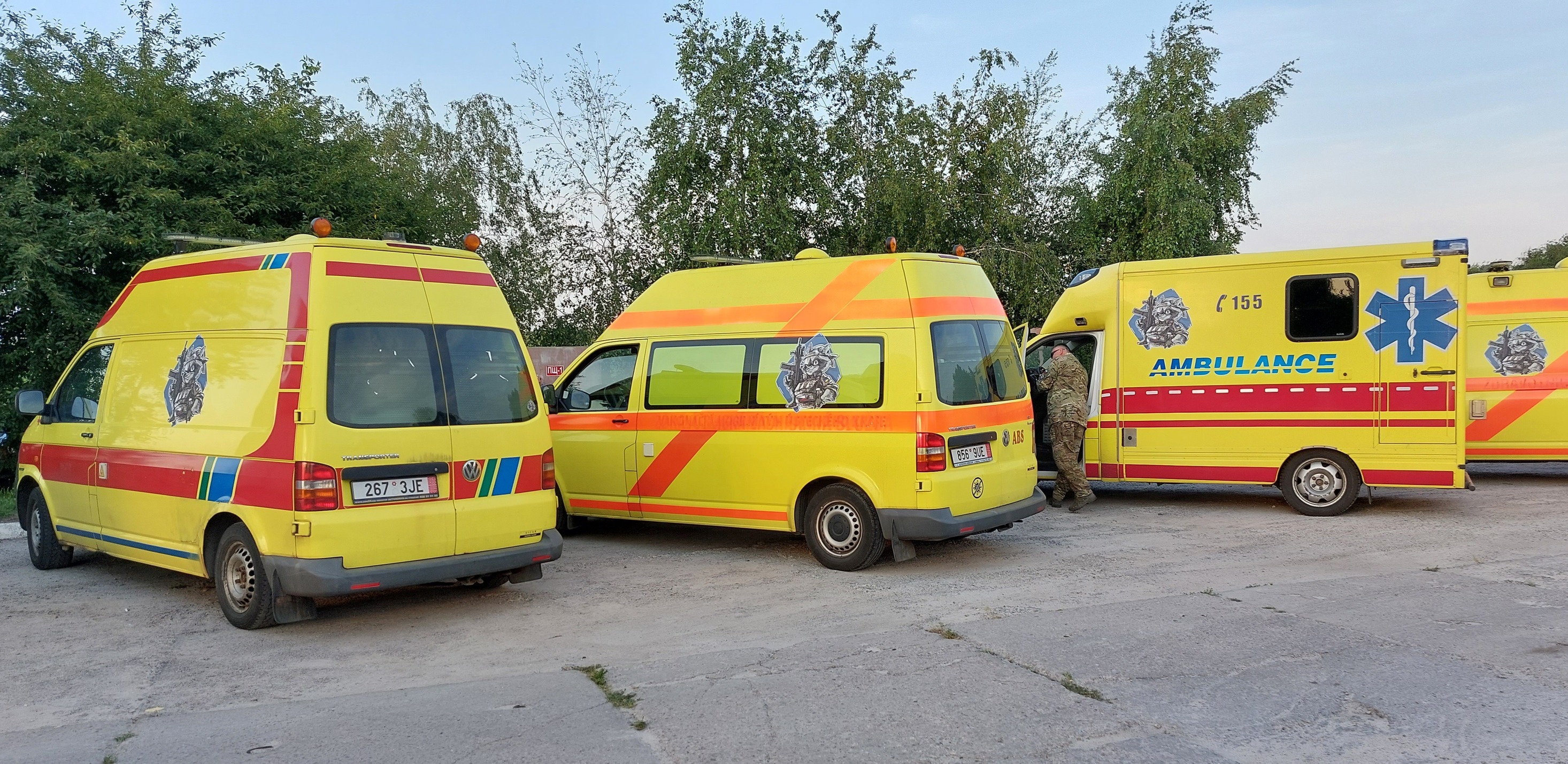
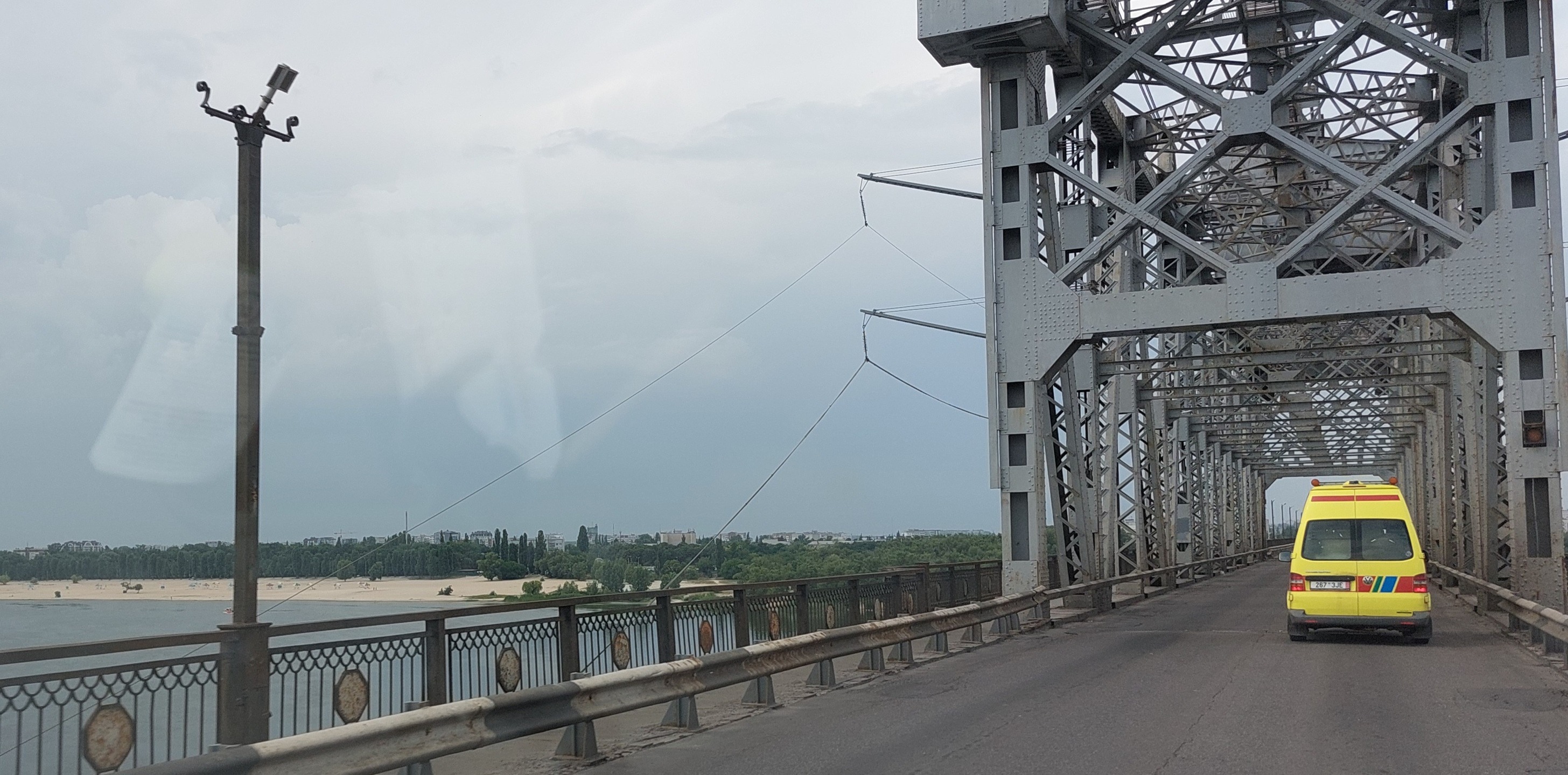
Day four - helping the troops and returning to Kiev
"Sully" commander of "East" group:
A nice couple of hours of sleep gets the team off to a fresh start for the day. Kharkiv is already bathed in early morning sunlight and the bustle of the city doesn't even let you know that it is often under rocket fire. The city is alive as if it were nothing, heavy traffic, cranes repairing buildings, infrastructure functioning. People just eventually manage to get used to everything.
We meet up with our security contacts and head out of the city towards the Kharkov front area. We do not go to the so-called 0, i.e. to the contact line with the enemy, we head to the field headquarters of the 41st Mechanised Brigade, which we promised to help. We are going to a distance of about 50 Km from the front line, all the roads around have been lined with MINES signs for some time. We even saw a Bozena 5 sub-machine with an EOD team at work behind the village of Balaklia. We turn onto a dirt road that should be mine free by now and drive another unit of kilometers between fields and small wooded areas. Our Ukrainian escort stops and tells us that the headquarters is a short distance away and the soldiers will be coming to meet us. The brigade headquarters is already quite a tempting target, so we prefer to wear our helmets and vests. After a few minutes of waiting, we learn that the headquarters has already moved a few kilometers away and here we return to the main road.
On the main one the ZSU guys are waiting to escort us to the headquarters. At a run-down, dysfunctional petrol station we meet the brigade commander, an experienced soldier who has been fighting Russian aggression since 2014. After a short introduction he offers us coffee directly at the headquarters. It is cleverly hidden under an old disused building, but there are vast cellars. The headquarters is laid out as I know it from our army. A large situation map in the middle, with more desks around it with computers, projected situations on a large wall, and lots of radios and electronics. It is bustling with activity, but upon our arrival the commander instructs us to quiet down and offers us seats. It's a great vote of confidence, as such headquarters contain a lot of sensitive information and are also an important target for the enemy. We are discussing the possibilities of our support to this brigade and what the greatest needs are now.
After the meeting, we move outside, handing over an ambulance for Field Dressing/Role 1 with medical equipment and supplies. We also hand over to the officer in charge of running Aero Intelligence the drones, computers and LCD displays we have procured for them. We go through the inventory of donated equipment together and get to know the officers in charge of the various parts of the Brigade Command. The brigade commander informs us that he has received information about a Russian reconnaissance drone overflight and we had better end our meeting, another command was being shelled not far from the barrel that morning. Of course we understand the situation, we take a photo together and leave, nobody wants to wait for a rocket or an artillery shell with his name on it. Before we leave, the brigade commander thanks us and informs us that he is also packing up the position, which was the plan anyway after our visit. We head back to Poltava, where we meet the rest of the "East" group and head to Kiev for a meeting with the rest of the away team and a well-deserved beer.
"Rorschach" the commander of the "Bravo" group:
Bravo team got up at dawn, obligatorily greeted by Russian artillery, which did not rest even at night, but it was getting parts of the city towards the Antonov Bridge.
With the end of the curfew we are leaving, heading for Kiev, 7 hours ahead of us, if all goes well. However, after a couple of hours our luck catches up with us as the first group. We manage to puncture a tire and pretty much blow a disk. Luckily, we happen to be a short distance from a petrol station where we have to refuel anyway. At the petrol station, our bike is inflated and we manage to drive to the tyre shop, which is a short distance away. Not only will they patch the wheel, and fix the rim ( that's why the UA is worth the classic tire tire ), but the tire shop has a great cafe ( really, great, with great service at the end of the world ) so that guarantees a few coffees and ice cream too.
After repairs we roll on, just below Kiev, where Marian from CESTA Hope of Life z.s. is still unloading humanitarian aid for the priests of the local community. They have been working together for a long time. Padre takes care of the community and helps quite a number of internal refugees with it.
Then we continue only to Kiev, where we meet the rest of the exit team.
"Riggs" group with help for the 503rd Battalion of Mariupol Marines
One of our vehicles separated from the eastern exit group and went to deliver supplies to the 503rd Independent Battalion of Marines. The boys had moved shortly before our departure and we had to adjust our itinerary. We had 3 drones, thermal imaging, night vision, a high-powered electric generator, three charging stations, backpacks, a few dozen tourniquets, and other medical supplies ready for them.
We arrive at the closed compound, where we have Slava, who is in charge of technical security, called at the gate. We hand over all the material to him and discuss priorities for further deliveries. In addition to the petrol central we brought, they need a diesel one (it's not always easy with petrol in combat conditions). The guys are most excited about the night vision (they already have one from our Humvee ambulance van) and also the thermal imaging camera. "Thermal imaging - these are lives saved for us" comments Slava on the new equipment. They will try out the backpacks we brought and give us info if this model is OK for them.
At the end we must not miss a group photo (the guys ask us to blur their faces) with the equipment. We get unit shirts from them. And immediately we move on to join the rest of the eastern exit group.
Martin "The Gift" (Gift for Putin):
Kharkiv is a huge city. It was once the capital of Ukraine. It doesn't look like there's a queue a few dozen kilometres away in the daytime. We're getting into the Vidma and getting out. After about an hour, the war starts to smell. We turn off the phones and put them in special bags that shield them perfectly. Destroyed bridges, the occasional collapsed building, nothing sown in most of the vast fields. The local farmers are afraid of landmines, which are plentiful around here. "When you go to pee, just stay on the asphalt at all times," Sully from Team 4 Ukraine warns us. We're heading for the 41st Mechanized Brigade. Its commander, Oleg, arrives at the meeting point in an old grey off-road. "We won't stand on the road", he smiles. "Let's go for coffee". We walk back about a kilometre, park the cars under the trees and head for the broken-down motor inn. Only now do we see the soldiers hidden nearby, the buried satellite dishes and camouflaged solar panels. We go to the basement. That's where the brigade headquarters is. The officers are turning off the plasma screens, the operational maps on the table are covered with a blanket. "Welcome to headquarters," Oleg smiles. We talk for about an hour. In the meantime, the phones on the desks ring, the soldiers whisper instructions into them. We have agreed. We're outside. We hand over the ambulance, medical supplies, drones and a few other things. A souvenir photo. "You should go," says Oleg. "Russian drones were already flying into the area yesterday, and a little while ago one was quite close again. As soon as you disappear, we'll disappear too. We'll just pack up the place and the headquarters will be somewhere else again for a few days." We're saying goodbye. We all meet in Poltava. It's 400 kilometres to Kiev. We're all looking forward to it. We're going for a beer tonight.
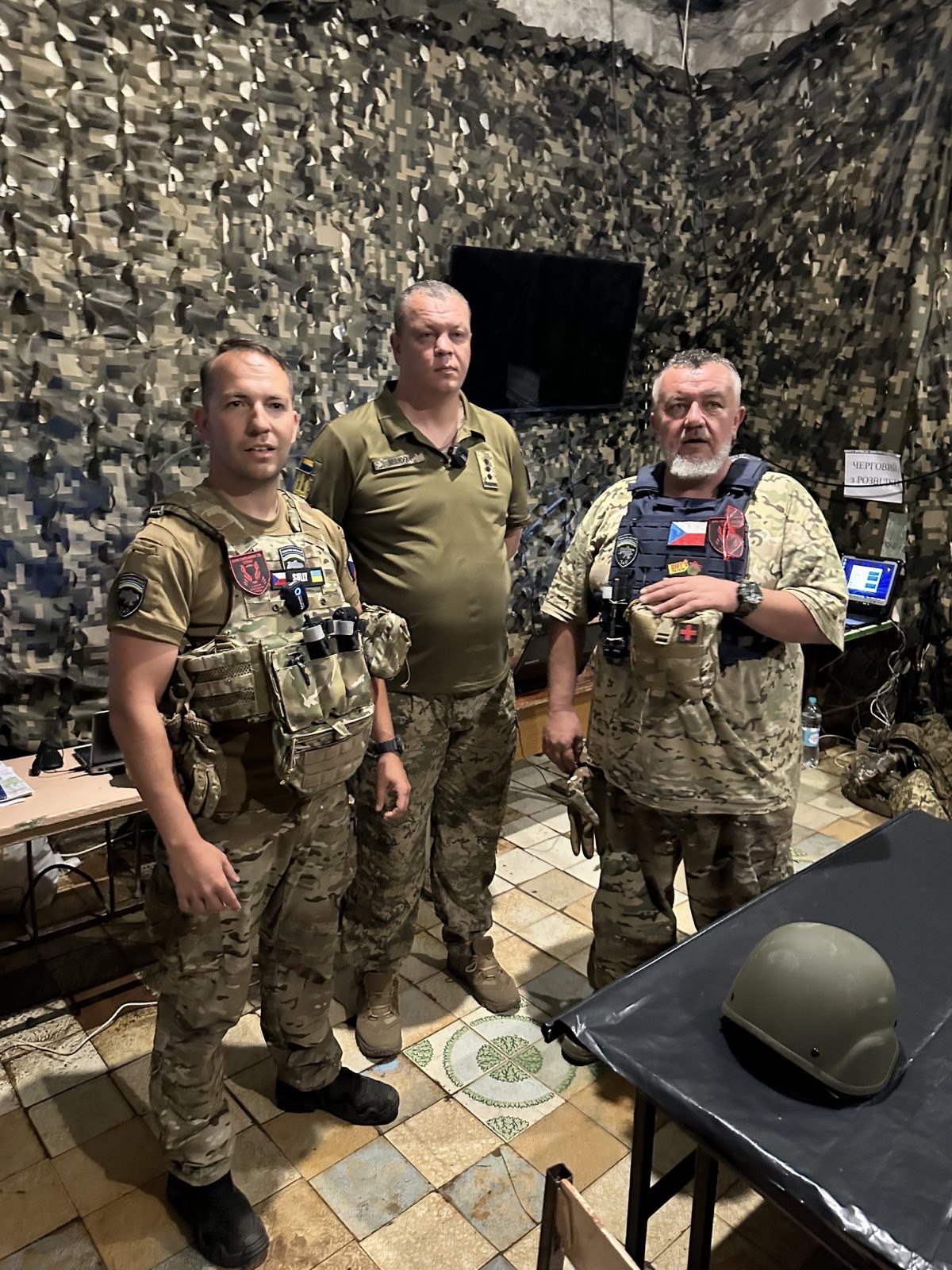
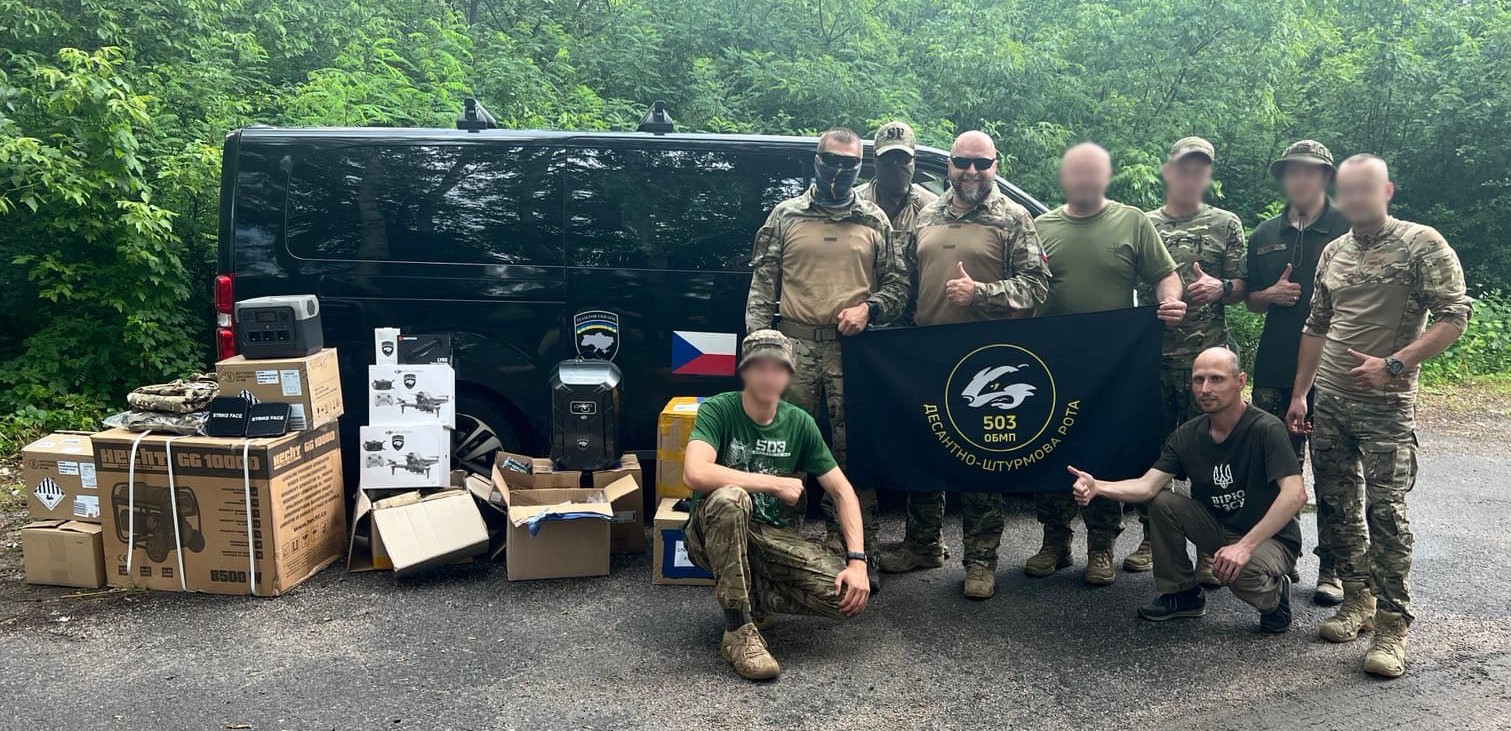
Day five - farewell to Kiev, memento of Russian aggression and shelter in Lviv
"Sully", the commander:
We arrive in Kiev at night and go for a beer with our friends from ZSU, who are currently in Kiev on business. Also the whole team deserves a liquid reward for their work during the trip. All bars and pubs close after 10pm, this is strictly enforced and supervised by the police. Back to our favourite oldschool Cossack hotel on Maidan we walk deliberately, for those who are in Kiev for the first time we go past the demonstration of destroyed Russian equipment and especially the wall of fallen defenders of Ukraine, it is again much longer than before...
As part of the outreach, the next morning before leaving Kiev I take the team to Irpin, Buchi and Hostomel to retell the events that happened here in February and March 2022. I try to stick as much as possible to the accounts of the witnesses and commanders we spoke to in April and May shortly after the withdrawal of the Russian invading troops. I believe this is similarly important to showing and visiting memorials to the Nazi crimes of World War II, as we are accustomed to doing in the Czech Republic. I am also taking the group to the local cemetery where the defenders of Ukraine and the murdered residents of Buchi are buried, there are still hundreds of them unidentified and with only a cross number... Memento mori .
Around lunchtime we leave Kiev in the direction of Lviv and the border crossing. We're lucky with the timing so we can stop at the Lviv Hideout, a famous local restaurant with a military theme. After dinner, it's just a drive to the border, the queue is long but the border guards let us go ahead. We will be thoroughly checked to make sure we are not carrying weapons, drugs or other prohibited items. We and the cars are carefully checked, which is good. It's hard to get anything illegal into the EU through Poland.
In Ukraine we left our Bohdan, who needed to deliver his cousin's thermovision to the front at Liman. Unfortunately it was impossible to get there earlier and so he is delivering it himself with the help of our friends from Kharkiv. He made a nice thank you video.
Martin "Gift" (Gift for Putin):
We are leaving Kiev. Next stop is Lviv. A few days ago a rocket fell here. It killed eight people. The city lives a normal, summer-tourist regime. The rumors that the military pub there is absolutely fantastic were not true. In the souvenir shop, I bought a plush tank and a copy of General Zaluzhny's driver's license. This is truly the land of unlimited possibilities. I can't wait to come back.
Everyone is now safely home and we are getting ready to resume our ongoing aid projects. "Light Against Darkness".
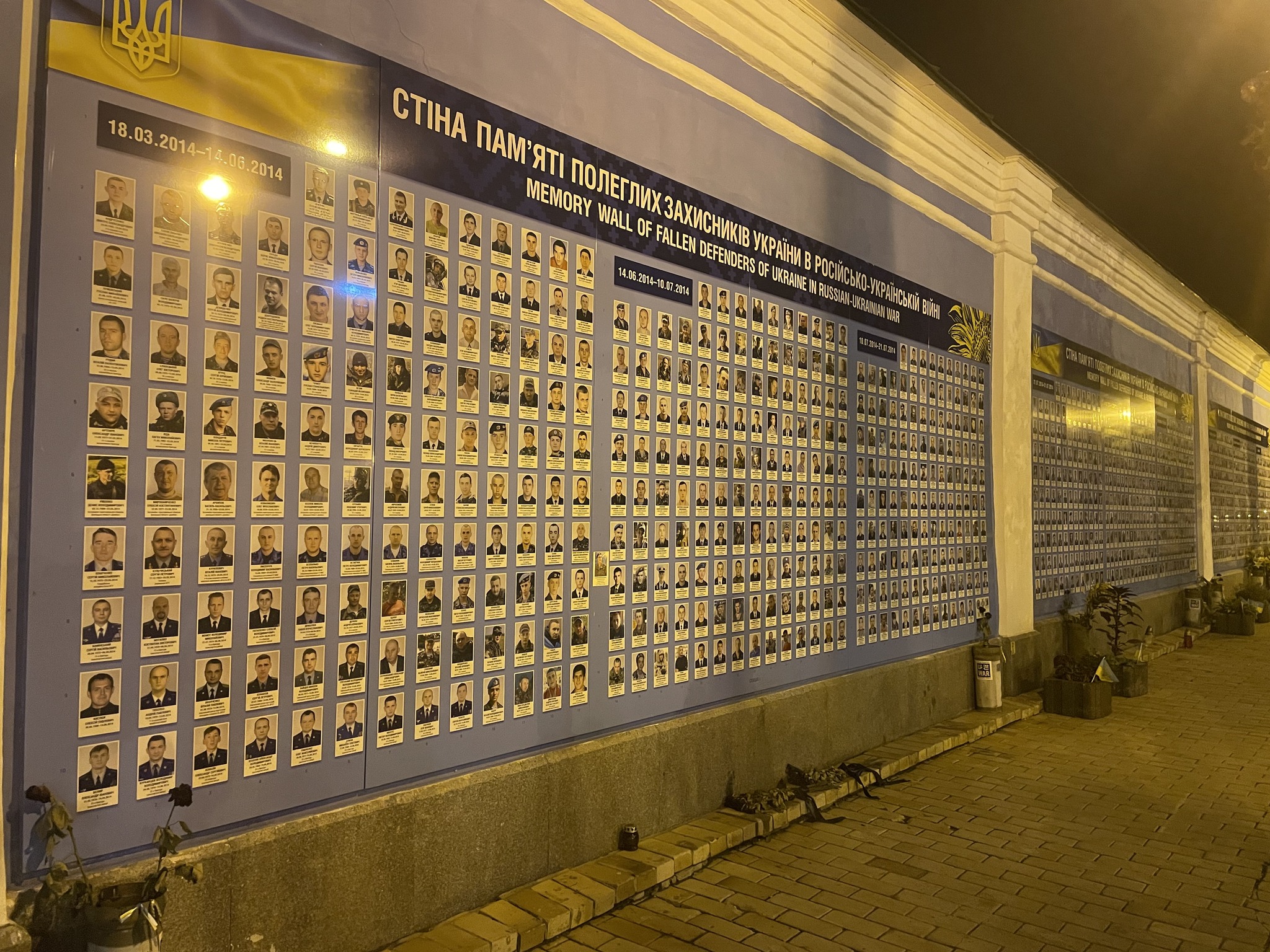
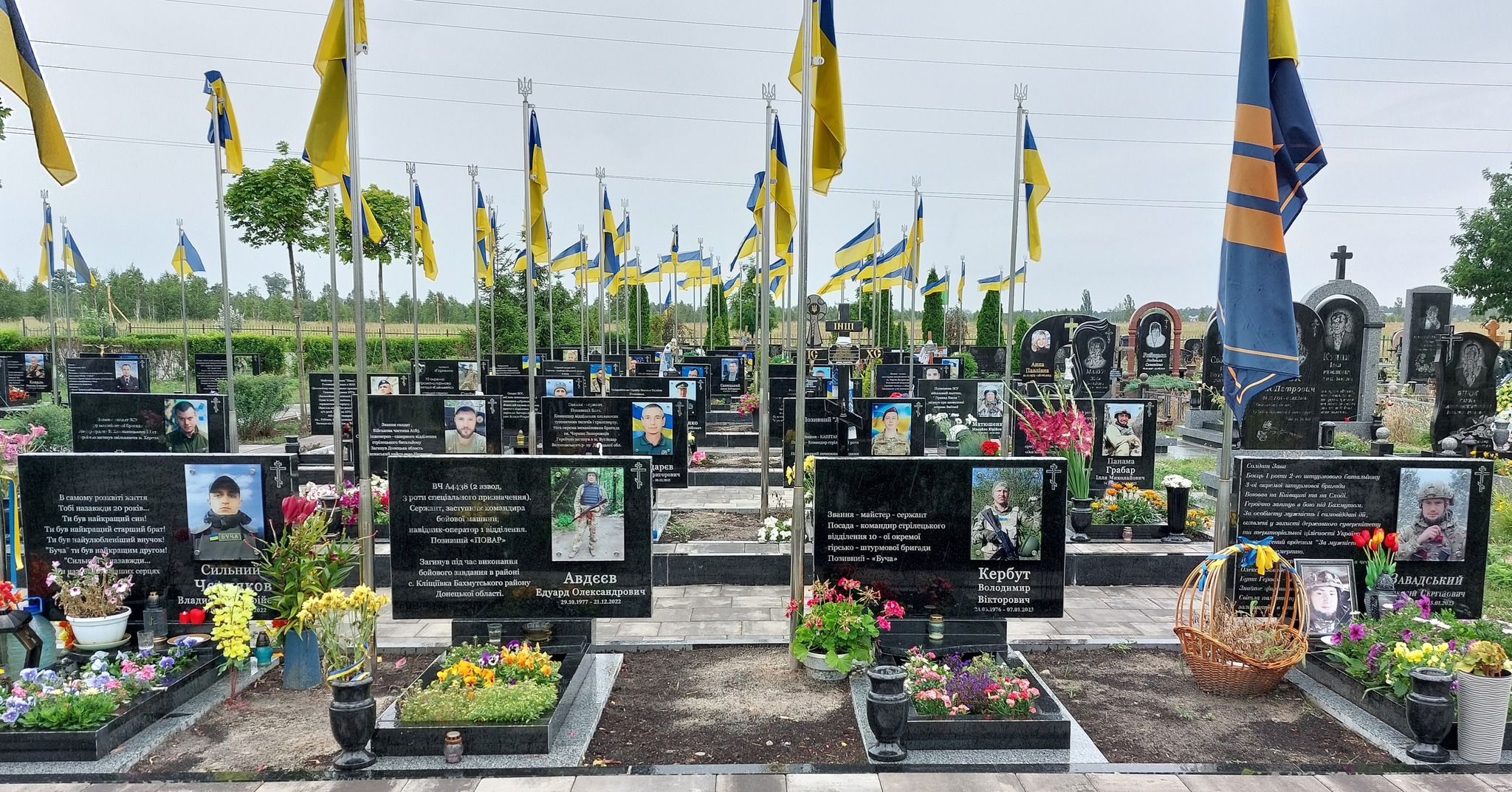
Powered by Froala Editor
